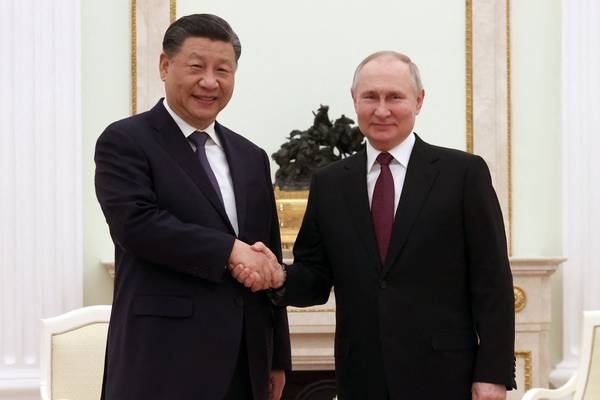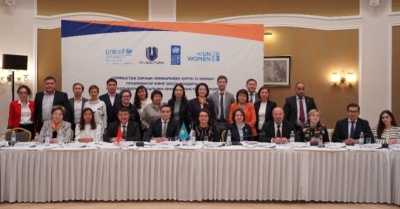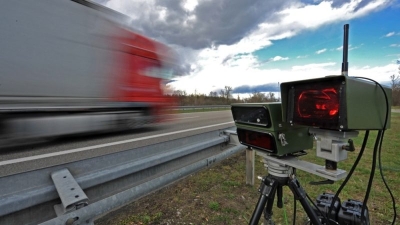Japanese and Chinese leaders visit rival capitals in Ukraine war

Japanese prime minister Fumio Kishida is on a surprise visit to Ukraine, hours after Chinese president Xi Jinping arrived in neighbouring Russia for a three-day visit. Mr Kishida will meet president Volodymyr Zelenskiy in the Ukrainian capital as the Asian rivals hold competing diplomatic offensives. He will “show respect to the courage and patience of the Ukrainian people who are standing up to defend their homeland under president Zelenskiy’s leadership, and show solidarity and unwavering support for Ukraine as head of Japan and chairman of the G7″, the Japanese foreign ministry said. At the talks in Kyiv, Mr Kishida will show his “absolute rejection of Russia’s one-sided change to the status quo by invasion and force, and to affirm his commitment to defend the rules-based international order”, the ministry’s statement added. [ US condemns Xi Jinping visit to Moscow days after ICC arrest warrant for Putin ] Russian president Vladimir Putin had earlier warmly welcomed Mr Xi to the Kremlin on a visit both nations described as an opportunity to deepen their “no-limits friendship”. Japanese public television channel NTV showed Mr Kishida riding a train from Poland to Kyiv, hours after he met Indian prime minister Narendra Modi in New Delhi and the week after a breakthrough summit with South Korean president Yoon Suk Yoel. In New Delhi, Mr Kishida called for developing and global south countries to raise their voices to defend the rules-based international order and help stop Russia’s war. Tokyo, which has territorial disputes over islands with China and Russia, is particularly concerned about the close relationship between Beijing and Moscow, which have conducted joint military exercises near Japan’s coasts. Mr Kishida, who is to chair the G7 summit in May, was the only leader of the group who had not visited Ukraine and was under pressure to do so at home. US president Joe Biden took a similar route to visit Kyiv last month, just before the first anniversary of Russia’s invasion of Ukraine. Due to the limitations of Japan’s pacifist constitution, Mr Kishida’s trip was arranged secretly. He is Japan’s first postwar leader to enter a war zone. Mr Kishida, invited by Mr Zelenskiy in January to visit Kyiv, was asked before his trip to India about a rumour of his possible trip at the end of March, but denied it and said nothing concrete had been decided. Japan has joined the US and European nations in sanctioning Russia over its invasion and providing humanitarian and economic support for Ukraine. Tokyo was quick to react because it fears the possible impact of a war in East Asia, where China’s military has grown increasingly assertive and has escalated tensions around self-ruled Taiwan, which Beijing claims as its territory. Mr Kishida is expected to offer continuing support for Ukraine when he meets Mr Zelenskiy. Television footage on NTV showed him getting on a train from the Polish station of Przemysl near the border with Ukraine, with a number of officials. Due to its pacifist principles, Japan’s support for Ukraine has also been limited to non-combative military equipment such as helmets, bulletproof vests and drones, and humanitarian supplies including generators. Japan has contributed over £5.7 billion to Ukraine, and accepted more than 2,000 displaced Ukrainians and helped them with housing assistance and support for jobs and education, a rare move in a country known for its strict immigration policy. – AP
US condemns Xi Jinping visit to Moscow days after ICC arrest warrant for Putin
Putin will be arrested if he comes to Ireland, Department of Justice says
:quality(70)/cloudfront-eu-central-1.images.arcpublishing.com/irishtimes/RZ2MNLAC6LEHOO227BFJMP3QEE.jpg)
Xi arrives in Moscow calling for pragmatism on Ukraine war
:quality(70):focal(2693x1016:2703x1026)/cloudfront-eu-central-1.images.arcpublishing.com/irishtimes/OFYLM2TT45Y3NVWBQU5IJPWFBA.jpg)
Varadkar pledges Ireland’s continued ‘support’ for Ukraine in call with Zelenskiy
:quality(70)/cloudfront-eu-central-1.images.arcpublishing.com/irishtimes/IRBP57D46VBWXNAV7YFJHWD3AY.jpg)
:quality(70)/cloudfront-eu-central-1.images.arcpublishing.com/irishtimes/VSB3ZF5Y7ZERFL7JY35QYJGVHA)



